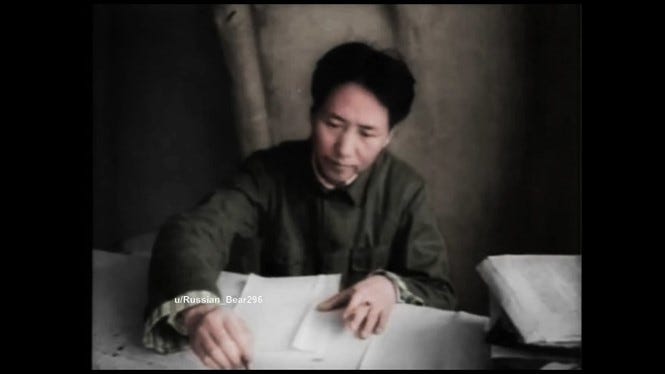Reply to Li Shu-yi
[a tsu, to the melody Butterfly Courts Flowers, Tieh Lien Hua]
[translated by Nancy Lin]
I lost my proud Yang,
You your dear Liu. –
Light as yangliu in the wind, they soar
Straight to the Realm beyond the blue.
What, ah, has Wu Kang of the moon brought?
In outstretched hands he bears
A cup of kwei blossom brew.
Lone Chang-O steps out too,
Our martyr-souls to entertain.
Ample sleeves spreading, she whirls in dance
Ten thousand leagues over the skyey main.
There, comes word of Tiger Subdued on earth.
Tears of joy fly –
Lo, a downpour of celestial rain!
Notes [by Nancy Lin]
Li Shu-yi, a middle school teacher in Changsha, whose husband Liu Chih-hsun, an old friend of Mao’s, joined the CPC in 1923, served as member on the Hunan Provincial Council and general secretary of the Provincial Peasant Association in 1926, and died in the Battle of Hunghu, Hupei in 1932.
In February 1957, Li sent Chairman Mao a poem she wrote back in 1933 in her husband’s memory. The above poem was Mao’s reply. It was originally entitled Roaming Immortals, a type of poetry made popular by Kuo Po (276-324 A.D.) with its descriptions of celestial scenes seen by the poets in dreams.
“Different from the traditional pieces of this genre”, Mao said in his letter to Li, “mine does not include the poet himself in the roaming, though samples of this are also found in latter-day tsu, as for instance those about the Double Seven Eve.”
The poem stands as a happy sample of the poet’s imaginative skill of pressing classical myths into modern service, wherein the commingling of personal sentiment and revolutionist dignity reaches a rare height of dynamic balance.
Proud Yang refers to Yang Kai-hui, Mao’s first wife who joined the CPC in 1921 and died a 29-year-old martyr to the communist cause in 1930.
Dear Liu refers of course to Liu Chih-hsun.
Yangliu: literally aspen and willow, now indifferently used to mean willow or weeping willow. The term consists of the same two characters as the surnames Yang and Liu, forming therefore an apt pun that adds to the piquancy of the metaphor.
Wu Kang: a mythical figure condemned to the Sisyphean labor of cutting the huge kwei blossom tree (5,000 feet tall) in the moon, which healed itself after every stroke of the axe.
Chang-O: another mythical figure who fled to the moon to live an eternal solitary life after secretly taking the elixir of life her husband, Hou Yi the Archer, had received from the Queen of the West.
Wu Kang and Chang-O, as offenders of the powers that be, are apt rebel-images for the occasion of the poem.
Tiger Subdued alludes to the ultimate overthrow of the Kuomintang rule in 1949.
[A word on translation is perhaps in place here for those interested. Insofar as poetry speaks through imagery, the translation of images requires especial care, the more so with Chinese poetry where the ideographic nature of the Chinese script often endows a word or phrase with a far greater power of visual suggestion and association than is possible in English. Take for instance the phrase ching yang in line 2 of the Chinese original. Because of its wind-radical, the character yang carries a definite wing-image which is absent in its English equivalent soar. To bring out the full image effect of the line, ‘Light as willows in the wind they soar’ is actually a more adequate and faithful rendering than ‘Like willows they soar’ as found in current translations. A subtler case exists with the verbal phrase peng chu in line 4. Peng means holding something with both hands; it carries in this particular context an implied cupor flack-image in addition to hand-image. To translate it simply as ‘present’ or ‘offer’ is to strip off all the image richness of the original for a barren prosaic presentation. An express indication of the implied pictures of hands and cup is almost imperative. – Nancy Lin]
[next - 25. Good-bye, God of Plague]



